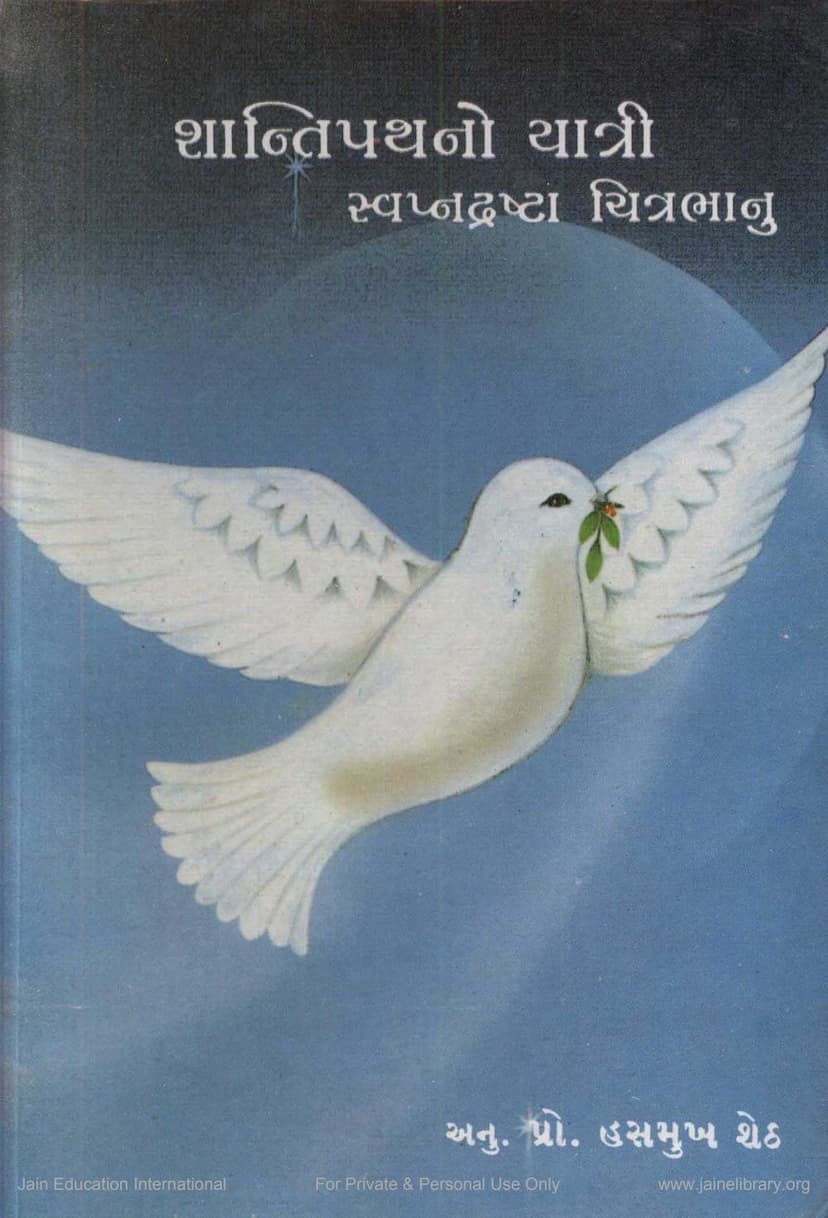Shantipathno Yatri Swapnadrushta Chitrabhanu
Added to library: September 2, 2025

Summary
Here's a comprehensive summary of the Jain text "Shantipathno Yatri Swapnadrushta Chitrabhanu" by Clare Rosenfield, translated by Prof. Hasmukh Seth:
Book Title: Shantipathno Yatri Swapnadrushta Chitrabhanu (The Traveler on the Path of Peace, the Visionary Chitrabhanu)
Author: Clare Rosenfield (Original), Prof. Hasmukh Seth (Translator)
Publisher: Navbharat Sahitya Mandir, Ahmedabad
Overview:
This book is a biographical account of the life and spiritual journey of Gurudev Shree Chitrabhanu, a prominent Jain spiritual leader and proponent of non-violence (ahimsa) and peace. The Gujarati translation, by Prof. Hasmukh Seth, aims to bring the essence of Chitrabhanu's life and teachings to a wider Gujarati-speaking audience. The narrative highlights his transformation from a young man named Ruprajendra to a globally recognized spiritual ambassador.
Key Themes and Narrative Arc:
The book traces Chitrabhanu's life through significant phases:
-
Early Life and Spiritual Awakening: The story begins with Ruprajendra's birth, his pious upbringing by his mother Chunibai and father Choghalal. Early life is marked by a profound spiritual inclination, deeply influenced by his mother's teachings and the tragic loss of his younger sister, Magi. These early experiences of loss and the philosophical explanations he received about life and death plant the seeds for his later spiritual quest.
-
Struggles and Self-Discovery: Ruprajendra's adolescence is depicted as a period of internal conflict. He grapples with the loss of his sister, the temptations of youth (smoking, rebellion), and the search for meaning. His father's guidance on honesty and integrity plays a crucial role. His journey through learning and experiences, including his encounter with the spiritual teachings of Mahatma Gandhi and Raman Maharshi, shapes his worldview. He embraces non-violence and a life dedicated to service.
-
Spiritual Transformation and Renunciation: The book details Ruprajendra's decision to renounce the worldly life and embrace Jain monasticism. This is a pivotal moment, marked by his father's understanding and eventual renunciation as well. He is initiated as a Jain monk, named Chandraprabh Sagarji, and later becomes known as Chitrabhanu. His early monastic life is characterized by rigorous discipline, meditation, and the pursuit of spiritual knowledge.
-
Embracing a Wider Mission: As Chitrabhanu's spiritual understanding deepens, he begins to see the limitations of societal structures and caste distinctions. He actively works to break down these barriers, advocating for equality and human dignity. His encounters with diverse individuals, from criminals in jail to villagers and foreign dignitaries, broaden his perspective and fuel his mission.
-
Global Propagation of Jain Principles: The narrative then shifts to Chitrabhanu's international endeavors. He travels across continents, sharing the core Jain principles of ahimsa (non-violence), truth, vegetarianism, and meditation. His message resonates with people from various backgrounds and cultures, including those in the West who are seeking spiritual solace and a path to peace. He establishes the "Divine Knowledge Society" to facilitate his work.
-
Interfaith Dialogue and Universalism: Chitrabhanu engages in interfaith dialogue, meeting with religious leaders and scholars from different traditions. He emphasizes the underlying unity of all religions and the universal nature of spiritual truths. His philosophy transcends narrow dogma, advocating for love, compassion, and understanding among all beings.
-
Key Life Events and Philosophies:
- Loss and Resilience: The early loss of his sister and mother shapes his understanding of impermanence and the nature of suffering, driving his spiritual quest for lasting peace.
- The Power of Thought and Action: The book emphasizes the Jain belief in karma and the power of one's thoughts and actions to shape their destiny.
- Self-Discipline and Control: Chitrabhanu's journey highlights the importance of self-discipline, meditation, and control over the senses and desires.
- Universal Love and Compassion: A central theme is the cultivation of universal love and compassion for all living beings, regardless of their background or beliefs.
- Ahimsa as a Way of Life: The book showcases ahimsa not just as a Jain tenet but as a practical philosophy for harmonious living.
- Breaking Societal Norms: Chitrabhanu's actions, such as breaking caste barriers in dining and his decision to travel abroad against traditional norms, demonstrate his commitment to a progressive and inclusive spiritual path.
- The Importance of the Present Moment: He stresses the value of the present moment and the power of positive thinking and self-belief.
Translator's Contribution:
Prof. Hasmukh Seth's translation is praised for its ability to convey the spiritual depth and narrative flow of the original work, making it accessible and inspiring for Gujarati readers.
Overall Impact:
"Shantipathno Yatri Swapnadrushta Chitrabhanu" is an inspiring biography that chronicles the remarkable journey of a soul dedicated to spiritual realization and the propagation of universal peace and non-violence. It serves as a testament to the power of inner transformation and the impact one individual can have in spreading a message of hope and harmony across the globe. The book offers profound insights into Jain philosophy and the practical application of spiritual principles in daily life.